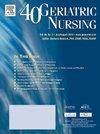Interventions to improve mood and/or social interaction in residents of long-term care facilities with dementia: A systematic review
IF 2.5
3区 医学
Q3 GERIATRICS & GERONTOLOGY
引用次数: 0
Abstract
Objective
To review the available evidence on non-pharmacological interventions to improve mood, quality-of-life (QoL)or social interactions in residents of long-term care facilities with dementia.
Methods
We searched Medline, Emcare, and PsycINFO using keywords: dementia, long-term care, mood, QoL, and social interaction. The search included long-term care residents clinically diagnosed with dementia and the methodological strength was evaluated using predefined criteria and tools.
Results
The final synthesis included 50 published studies with significant heterogeneity. There was more evidence for green therapy, small-scale living, Snoezelen, Storytelling, group exercise, reminiscence and Montessori activities.
However, there was minimal evidence for dementia café, music, recreation time, art activities, staff wearing street-clothes, play activities, humour, traditional food, emotion oriented, simulated presence, computer, wellbeing-enhancing occupation, MultiTANDEM Plus, multisensory, person-centred, animal assisted and Staff Training interventions.
Conclusion
Multiple non-pharmacological interventions showed promise in enhancing mood, QoL, and social interaction. Future research could explore long-term effects of therapy, increase sample size of patients, and improve generalizability of therapy.
干预措施改善长期护理机构痴呆患者的情绪和/或社会互动:系统回顾
目的回顾非药物干预改善长期护理机构痴呆患者情绪、生活质量和社会交往的现有证据。方法检索Medline、Emcare和PsycINFO,关键词:痴呆、长期护理、情绪、生活质量和社会互动。研究纳入临床诊断为痴呆症的长期护理居民,并使用预定义的标准和工具评估方法学的强度。结果最终的综合纳入了50篇已发表的具有显著异质性的研究。更多的证据表明绿色疗法、小规模生活、Snoezelen、讲故事、小组练习、回忆和蒙台梭利活动。然而,关于痴呆症的证据很少:咖啡、音乐、娱乐时间、艺术活动、员工穿着街头服装、游戏活动、幽默、传统食物、情感导向、模拟在场、电脑、增强幸福感的职业、MultiTANDEM Plus、多感官、以人为本、动物辅助和员工培训干预。结论多种非药物干预措施对改善患者情绪、生活质量和社会交往有积极作用。未来的研究可以探索治疗的长期效果,增加患者的样本量,提高治疗的普遍性。
本文章由计算机程序翻译,如有差异,请以英文原文为准。
求助全文
约1分钟内获得全文
求助全文
来源期刊

Geriatric Nursing
医学-护理
CiteScore
3.80
自引率
7.40%
发文量
257
审稿时长
>12 weeks
期刊介绍:
Geriatric Nursing is a comprehensive source for clinical information and management advice relating to the care of older adults. The journal''s peer-reviewed articles report the latest developments in the management of acute and chronic disorders and provide practical advice on care of older adults across the long term continuum. Geriatric Nursing addresses current issues related to drugs, advance directives, staff development and management, legal issues, client and caregiver education, infection control, and other topics. The journal is written specifically for nurses and nurse practitioners who work with older adults in any care setting.
 求助内容:
求助内容: 应助结果提醒方式:
应助结果提醒方式:


